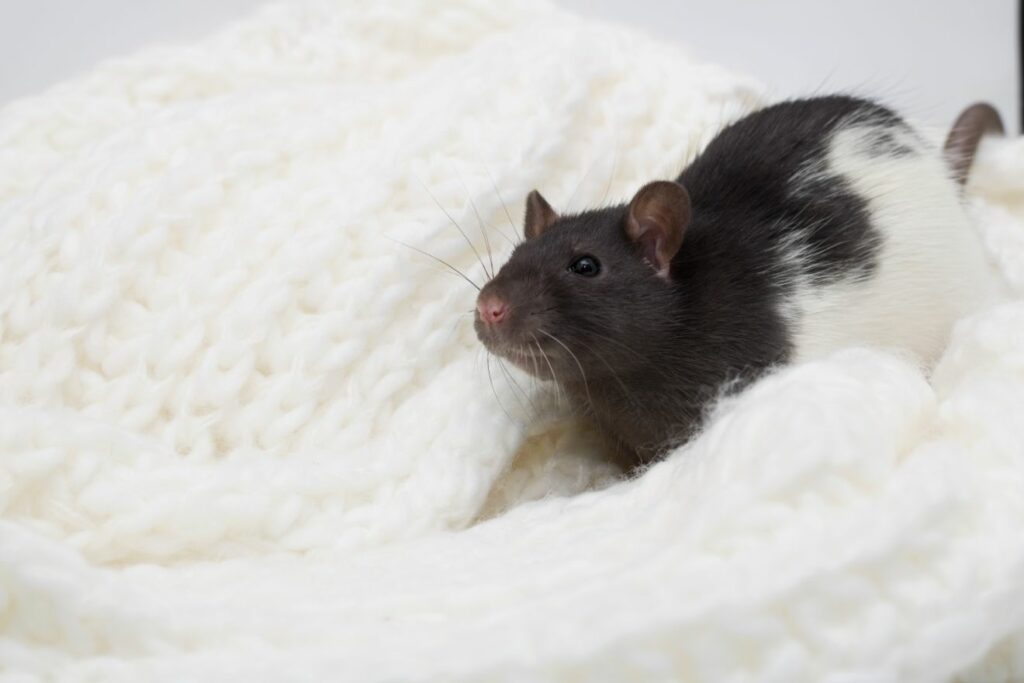Pet rats have become increasingly popular as pets, and for good reason. They are intelligent, social, and entertaining companions.
However, like any other living creature, they have their unique needs and behaviors that need to be understood to ensure their well-being.
In this article, we will explore the factors that can cause stress in pet rats, how to recognize the signs and symptoms of stress, and how to prevent and manage it.

Factors that Can Cause Stress in Pet Rats
Pet rats are highly sensitive creatures, and several factors can trigger stress in them. These factors include:
Loud Noises and Sudden Movements
Pet rats have a keen sense of hearing, and loud noises can be stressful for them. Sudden movements can also startle them and cause anxiety.
Poor Living Conditions
Pet rats require a clean, comfortable, and spacious living environment. Overcrowding, inadequate ventilation, and dirty cages can lead to stress and health problems.
Lack of Social Interactions
Pet rats are social creatures and require regular social interactions to thrive. Isolation can lead to stress and depression.
Inadequate Nutrition and Hydration
A balanced diet and access to clean water are essential for a pet rat’s health and well-being. Malnutrition and dehydration can cause stress and other health problems.
Changes In Environment
Pet rats are creatures of habit, and sudden changes in their environment can cause stress. Moving to a new home, the introduction of new pets or people, and changes to their daily routine can all trigger stress.
Presence of Predators or Other Animals
Predators and other animals can be a source of stress for pet rats. Even the presence of a predator’s scent can cause anxiety.
Sickness and Pain
Illness and pain can cause stress in pet rats. It is essential to observe and monitor their behavior and seek veterinary care if necessary.
Signs and Symptoms of Stress in Pet Rats
As pet owners, it is crucial to recognize the signs and symptoms of stress in our furry friends. The following are some common signs and symptoms of stress in pet rats:
Loss of Appetite and Weight
Stress can cause a loss of appetite and weight loss in pet rats. It is essential to monitor their food intake and weight regularly.
Reduced Activity and Playfulness
Stress can lead to reduced activity and playfulness in pet rats. They may seem lethargic, uninterested in their surroundings, and spend more time sleeping.
Aggression, Fear, or Shyness
Stress can cause changes in behavior, such as aggression, fear, or shyness. Pet rats may become more defensive, less sociable, or hide more often.
Self-Injurious Behavior
Stress can cause self-injurious behavior in pet rats. They may excessively groom themselves, bite their tails, or even pull out their fur.
Physical Signs, e.g., Piloerection
Stress can cause physical signs in pet rats, such as piloerection (raised fur), where the fur stands on end.
How to Prevent and Manage Stress in Pet Rats
Preventing and managing stress in pet rats is essential for their health and well-being. The following are some ways to do so:
Provide a comfortable and safe living environment
Pet rats require a clean, spacious, and comfortable living environment. Ensure that their cage is adequately sized, cleaned regularly, and well-ventilated.
Offer a nutritionally balanced diet and clean water
A balanced diet and access to clean water are vital for a pet rat’s health. Ensure that their food and water are changed daily and offer fresh fruits and vegetables as treats.
Provide opportunities for socialization and play
Pet rats require regular social interactions and opportunities for play. Spend time interacting with them, provide toys, and consider getting them a companion.
Limit exposure to stressful stimuli
Limit exposure to loud noises, sudden movements, and other stressful stimuli. Keep their cage away from high-traffic areas, and avoid sudden changes or disruptions to their environment.
Regular veterinary checkups
Regular veterinary checkups are essential to monitor your pet rat’s health and detect any potential health problems early.
Offer positive reinforcement training
Positive reinforcement training can help reduce stress and improve your pet rat’s behavior. Reward good behavior with treats and praise, and avoid punishment or negative reinforcement.
Use calming aids when necessary
Calming aids, such as pheromone sprays or herbal supplements, can help reduce stress in pet rats. Consult with your veterinarian before using any calming aid.
Provide proper handling and care
Proper handling and care can help reduce stress in pet rats. Handle them gently, avoid sudden movements, and provide regular grooming and hygiene care.
Conclusion
In conclusion, pet rats are intelligent, social, and entertaining companions that require proper care and attention.
Understanding the factors that can cause stress in pet rats and recognizing the signs and symptoms are crucial for their well-being. By providing a comfortable and safe living environment, offering a balanced diet and clean water, providing opportunities for socialization and play, limiting exposure to stressful stimuli, regular veterinary checkups, positive reinforcement training, using calming aids when necessary, and providing proper handling and care, we can prevent and manage stress in our furry friends.
Remember, happy and healthy pet rats make for happy and content pet owners.
- How Long Do American Eskimo Dogs Live? Important Factors and Care Tips - September 29, 2023
- Do American Bulldogs Need Grooming? Essential Tips and Care Guidelines - September 29, 2023
- Do Bengal Cats Enjoy Playing? Essential Tips for Keeping Them Active - September 29, 2023